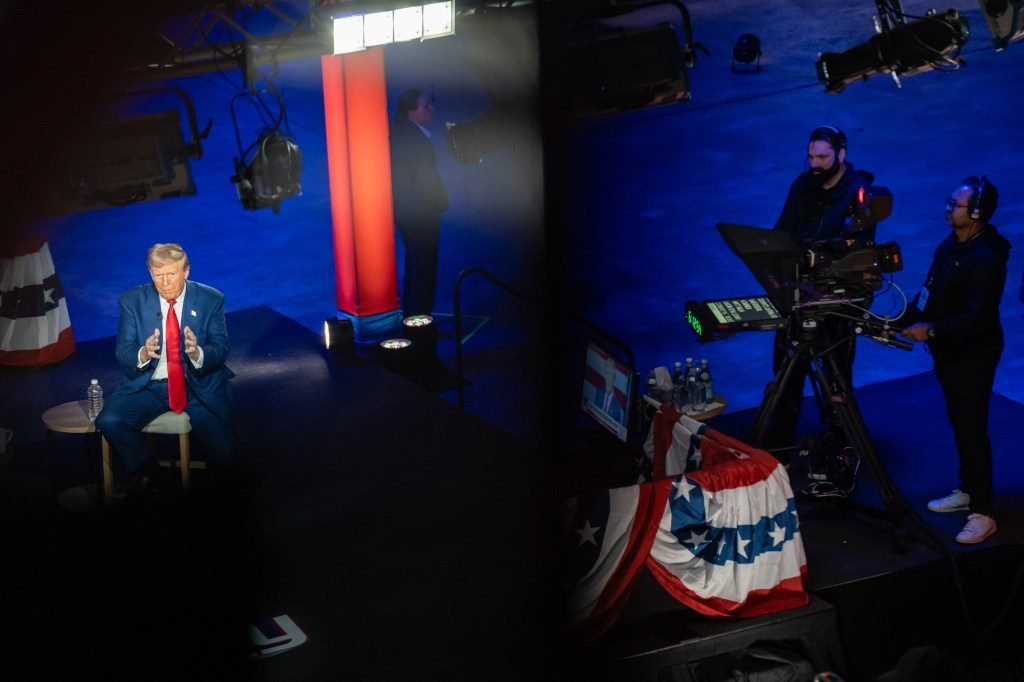
A little over a month out from Donald Trump’s second inauguration, all signs point to a more pliant media and tech apparatus than the one that greeted him in 2017.
The latest organization to roll over is ABC News, which settled a defamation lawsuit Trump brought against the network and George Stephanopoulos, related to a March interview in which Stephanopoulos repeatedly claimed on air that Trump had been found liable of raping E. Jean Carroll. Per that settlement, the network will donate $15 million to Trump’s future presidential library, as well as an additional $1 million each year for Trump’s legal fees.
In May 2023, a jury in a civil proceeding found Trump found liable for “sexually abusing” Carroll, but the ruling fell short of New York’s technical definition of rape. In a memo on the ruling, District Judge Lewis A. Kaplan wrote, “Forcible, unconsented-to penetration of the vagina or of other bodily orifices by fingers, other body parts, or other articles or materials is not called ‘rape’ under the New York Penal Law. It instead is labeled ‘sexual abuse.’” Later in the memo, he wrote, “the jury implicitly found Mr. Trump did in fact digitally rape Ms. Carroll.”
This is what Carroll alleges happened in the mid-1990s in a Bergdorf Goodman dressing room:
The moment the dressing-room door is closed, he lunges at me, pushes me against the wall, hitting my head quite badly, and puts his mouth against my lips.[…]He seizes both my arms and pushes me up against the wall a second time, and, as I become aware of how large he is, he holds me against the wall with his shoulder and jams his hand under my coat dress and pulls down my tights.
[…]The next moment, still wearing correct business attire, shirt, tie, suit jacket, overcoat, he opens the overcoat, unzips his pants, and, forcing his fingers around my private area, thrusts his penis halfway—or completely, I’m not certain—inside me.”
Taken on its own, the question of what you are allowed to call the person found legally liable of doing that may feel like a semantic one, but the legal stakes are much higher. According to reporting by the New York Times, “several experts in media law said they believed that ABC News could have continued to fight,” especially considering the high bar for defamation cases against public figures. The settlement was a rare win for the Trump team, which has seen similar cases against CNN, the Washington Post, and the New York Times dismissed.
ABC’s concession is most notable in the context of other tech and media companies trying to set the table for a less contentious relationship with the Trump administration this time around. Sam Altman, Mark Zuckerberg, and Jeff Bezos each donated $1 million to Trump’s inauguration fund last week; Bezos made the executive decision to cease the Post’s 48-year history of endorsing candidates, just a week before the 2024 election, rather than run a written endorsement of Kamala Harris. The Los Angeles Times also ditched its presidential endorsement, and its owner, Patrick Soon-Shiong, has announced that the paper’s product team was working on a bizarre “bias meter” that will sit on news and editorial pages and allow readers to see “both sides” of a story.
It’s clear that media executives aren’t interested in being branded as members of “the resistance” this time around, and instead have chosen to submit in advance. Whether this saves them anything more than time remains to be seen. It’s a cynical move that reflects the increasing precarity of an industry that spent the better part of the last decade sitting high on pageview and subscription spikes.
That’s not to say that these decisions are being made in the interest of the journalists employed at these organizations. Heavy-handed bosses aren’t any better for morale in media than they are anywhere else, and Bezos’s machinations haven’t benefited the Post‘s business much, either. In the wake of Bezos’s decision to rescind editorial endorsements, more than 200,000 people cancelled their subscriptions in protest, a move that hurt the newsroom materially far more than whatever perceived bias the Post‘s owner detected. Despite Bezos’s claims to the opposite, these kinds of decisions erode the public’s trust in media institutions, which in turn makes it harder to convince people that real, reported news is something that is worth seeking out and, most importantly, paying for.
It wasn’t so long ago, in the years before the Hulk Hogan verdict, that the thought of a large and well-funded news organization getting bullied into a legal settlement by a public figure like Trump would have been unthinkable. The fact that such a thing can happen now says nothing good about what’s still to come.
There is no appeasing someone like Donald Trump, and ABC’s capitulation seems to have only emboldened him to go after more media outlets; he’s now suing the Des Moines Register and pollster J. Ann Selzer for releasing a poll that showed Harris leading Iowa a few days before the election, which he claims was a strategy to help Democrats win. It’s a ridiculous lawsuit premised on the Iowa Consumer Fraud Act; Trump’s team is alleging that the paper and Selzer engaged in false advertising. It’s a case that shouldn’t merit serious consideration, but after the ABC settlement, anything feels possible.






